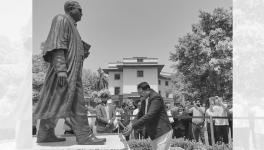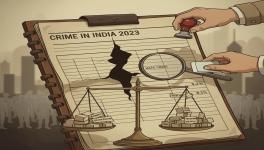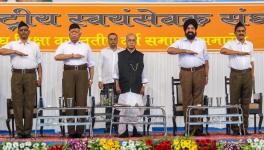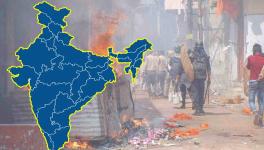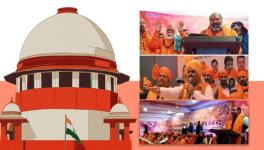Why Frontier Gandhi Needs to be Remembered Today
As intolerance and violence try to strike deeper roots in Indian society, Khan Abdul Ghaffar Khan is more relevant than ever. Born on 6 February 1890 in the Northwest border city of Utmanzai located in present-day Pakistan, Khan’s father was a Pathan tribal chief.
At an early age, Khan was inclined towards activism. He sought to fight poverty and spread education. He realised quickly that the British Raj treats their community as second-class. Later, he came to be known as Frontier Gandhi. The important phase of his life as a political activist began in 1919 when he protested the Rowlatt Act. It was at this time that he met Gandhi.
In the following year, Khan also joined the Khilafat movement, a campaign launched by the Muslims of India to influence the British government not to abolish the Ottoman Caliphate.
In 1921, Khan was made president of the district Khilafat committee in his native North-West Frontier Province. He played a prominent role in the formation of Anjuman-e-Islāh-e Afghānia, or Afghan Reform Society, and a youth movement in 1927.
In 1929, Khan organised the Pathans, who, for their red uniforms, came to be called the Red Shirts movement, popularly known as the Khudai Khidmatgar. It envisaged a non-violent nationalist movement in support of Indian independence and tried to raise and mobilise the Pashtun political consciousness. The Pakhtun knew him as Khan Abdul Gaffar Khan or Fakhr-e- Afghan, or pride of Afghans, and Badshah Khan.
Khan was deeply influenced by Gandhiji’s philosophy of non-violence, which became the foundation of the teachings of the Khudai Kidmatgar. He taught his associates the value of sacrifice and rejected the notion of political Islam, which was then symbolised by Muhammad Ali Jinnah’s Muslim League.
At the Karachi Session of the Congress party in 1930—by which time Khan had become a close comrade of Gandhi—the Khudai Khidmatgar actively supported the Congress’ action for independence. On 23 April 1930, he called a mass meeting to act on civil disobedience. Its members organised a march to Peshawar. The civil disobedience moment in the Frontier Provinces began from Khan’s ancestral village. At the time, he stressed the importance of the national struggle and emphasised the power of non-violence to bring change.
Khan was arrested and sent to Hazaribagh Jail in Bihar. Once he was released, he went to Gandhi’s Sabarmati Ashram. Seeing an emaciated Khan, Gandhi thought eating of meat should be permitted on the ashram. But Khan, though weak, was reluctant to accept his offer.
In August 1946, communal riots broke out in various parts of India, in Calcutta [now Kolkata], and soon spread to Noakhali, Bihar, and parts of present-day Uttar Pradesh. Khan was in Bihar along with his associates in the Khudai Khidmatgar, who visited many places, organised relief camps, and conducted peace meetings amongst both communities.
At one such meeting of Hindus, Muslims, and Sikhs, held at the Gurudwara Harmandir Sahib [Golden Temple], the birthplace of Sikh Guru Gobind Singh, he made an emotional appeal: “India today seems an inferno of madness and my herat weeps to see our homes set on fire by ourselves. I find darkness reigning over India today and my eyes vainly turn from one direction to another to see light.”
Ghaffar Khan staunchly believed in India remaining united and rejected the Partition because he felt he cannot be a part of dividing the country along religious lines. He was also wary of Pashtun autonomy, because he had a hunch his community would victimise the Punjabis and others.
Subsequently, Khan proposed an autonomous “Pashtunistan” within the federation of Pakistan, but this was not accepted.
It is not difficult to comprehend the pain and anxiety Khan experienced during those days. “Before long, we shall become aliens in Hindustan,” he said. “The end of our long fight will be to pass under the domination of Pakistan—away from Bapu, away from India, away from all of you. Who know what the future holds for us…”
Khan remained an activist and was arrested several times between 1948 and 1956 for opposing the “one unit” scheme which sought to merge the four provinces of West Pakistan into a single province. He visited India during the centenary celebrations of the Indian National Congress in 1985, along with Wali Khan and his grandson, Zulfiqar Ali Khan. Later, he was honoured with India’s highest civilian award, Bharat Ratna. He was the first non-Indian to receive this honour.
A true world citizen, he passed away on 20 January 1988.
Not only in South Asia, but the entire world can also learn from Khan and his legacy, particularly in the Muslim world. Muslim social leaders do not recognise the legacy of people such as him. Yet there is a strength and energy to be drawn from the life and works of Khan sa’ab and his philosophy based on service, compassion, and solidarity for humanity.
Today all kinds of divides are becoming wider and wider, be they economic, cultural, racial, or based on gender or religion. Khan’s message will be relevant, for he worked for a more peaceful and just world, where there will be no discrimination based on identity.
Gandhi’s personal secretary Mahadev Desai described Khan a long time back. Desai said he knows of many Muslims who are true as steel and ready to sacrifice all for Hindu-Muslim unity, but none “greater than or even equal to Khan Abdul Ghaffar Khan in the transparent and ascetic severity of his life, combined with extreme tenderness and living faith in god.”
The author is associated with various social action groups working for justice and peace. The views are personal.
Get the latest reports & analysis with people's perspective on Protests, movements & deep analytical videos, discussions of the current affairs in your Telegram app. Subscribe to NewsClick's Telegram channel & get Real-Time updates on stories, as they get published on our website.









